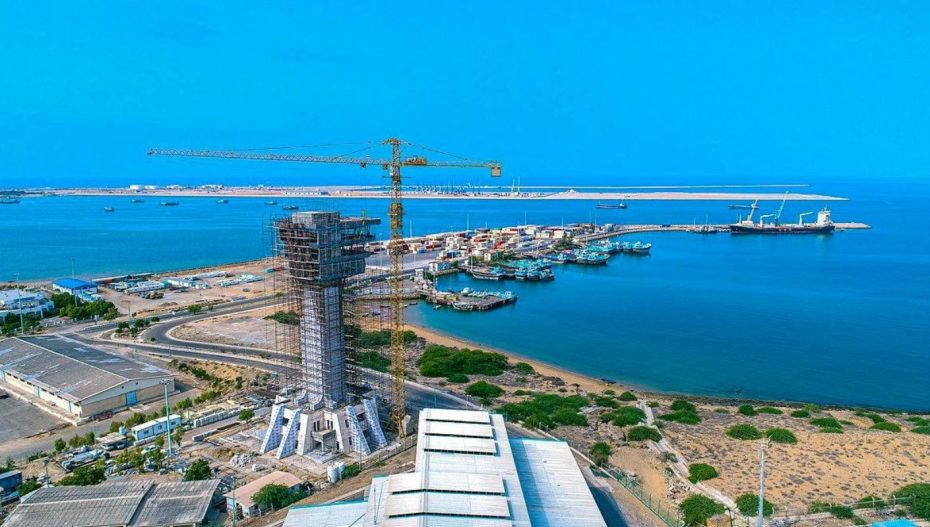After over two decades of efforts, hurdles and negotiations, India has finally made a significant headway in Iran’s Chabahar port as it signed a landmark 10-year agreement to manage the strategic port.
This is being seen as a important move that will help it crank up trade with Central Asia and ensure safe and secure transportation of crude oil from Iran while bypassing maritime chokepoints like the Strait of Hormuz.
The port, which New Delhi originally proposed to develop in 2003, sits strategically on the Gulf of Oman and offers Indian goods a vital gateway to landlocked Afghanistan and Central Asia via the International North-South Transport Corridor, bypassing Pakistan.
“The long-term bilateral contract on Chabahar Port Operation was signed between Indian Ports Global Limited (IPGL) of India and the Port & Maritime Organisation (PMO) of Iran, enabling operation of Shahid-Beheshti in Chabahar Port Development Project for a period of 10 years,” an official statement said.
The deal was signed in the presence of India’s shipping minister Sarbananda Sonowal and Iran’s minister for roads and urban development, Mehrdad Bazrpash.
India Ports Global Private Limited (IPGPL) is a joint venture company formed by Jawaharlal Nehru Port Trust and Kandla Port Trust, and has been incorporated under the Indian Companies Act, 2013.
IPGPL will invest $120 million to beef up the facilities at Chabahar port. The company will also open a $250 million credit window that will be used to develop infrastructure at the Iranian port.
The long-term agreement replaces an earlier pact signed in 2016, which focused on India’s operations at the Shahid Beheshti terminal within Chabahar port and had been subject to annual renewals. Chabahar port’s utilisation has been crucial for India, facilitating aid shipments to Afghanistan and supporting trade ties with Iran.
The management takeover of the strategic port potentially reshapes the trade dynamics among India, Iran and Afghanistan. By directly tapping into the vast market potential of Central Asia, India aims to bypass Pakistan and strengthen regional connectivity.
Last year, India used Chabahar port to transport 20,000 tonnes of wheat aid to Afghanistan. In 2021, it was used to supply environmentally friendly pesticides to Iran.
Iran holds significant reserves of oil and natural gas, making it a crucial partner for India’s energy security. Chabahar provides India with a strategic foothold in Iran’s energy-rich region, enabling smoother access to Iranian resources.
As China expands its footprint across South Asia through its Belt and Road Initiative (BRI), India seeks to counterbalance Chinese influence by bolstering its own connectivity projects, including Chabahar. China has been planning to invest $1.6 billion to develop Pakistan’s Gwadar port under President XI Jinping’s grand plan to recreate the Silk Route — a plan that is currently mired in problems.
India Ports Global Private Limited (IPGPL) is a joint venture company formed by Jawaharlal Nehru Port Trust and Kandla Port Trust, and has been incorporated under the Indian Companies Act, 2013.
Meanwhile, Iran’s bete noire US has warned of sanctions on India for aligning with the Islamic nation.
Hours after signing of the deal, the United States reiterated that “anyone considering business deals with Iran needs to be aware of the potential risk of sanctions.”
This comes days after the US announced new sanctions on Iran targeting its unmanned aerial vehicle production after its attack on Israel.
“We’re aware of these reports that Iran and India have signed a deal concerning the Chabahar port. I will let the government of India speak to its own foreign policy goals vis-a-vis the Chabahar port as well as its own bilateral relationship with Iran,” Vedant Patel, deputy spokesperson of the US State Department, said while responding to a question of the agreement between India and Iran.
“I will just say, as it relates to the United States, US sanctions on Iran remain in place and we’ll continue to enforce them,” he added.
Further, on being asked if that would mean including sanctions against Indian firms, Patel said, “Broadly, you’ve heard us say this in a number of instances, that any entity, anyone considering business deals with Iran, they need to be aware of the potential risk that they are opening themselves up to and the potential risk of sanctions.”
This is the first time India will take over the management of an overseas port.
In April this year, the US imposed sanctions on over a dozen companies, individuals and vessels, including three from India, for facilitating illicit trade and UAV transfers on behalf of the Iranian military.
On the other hand, India’s External Affairs Minister S Jaishankar said the Chabahar Port will see more investments and connectivity linkages coming out of it. He also said the port will help connect India and Central Asia better.
“Right now the port has not grown. If you don’t have a long-term agreement, it is difficult to invest in a port. So the very clear expectation is that part of the Chabahar that we are involved in will definitely see more investments, it will see more connectivity linkages coming out of that port,” Jaishankar said.
“We believe today that connectivity is a big issue in that part. Chabahar will connect us with Central Asia,” he added.












